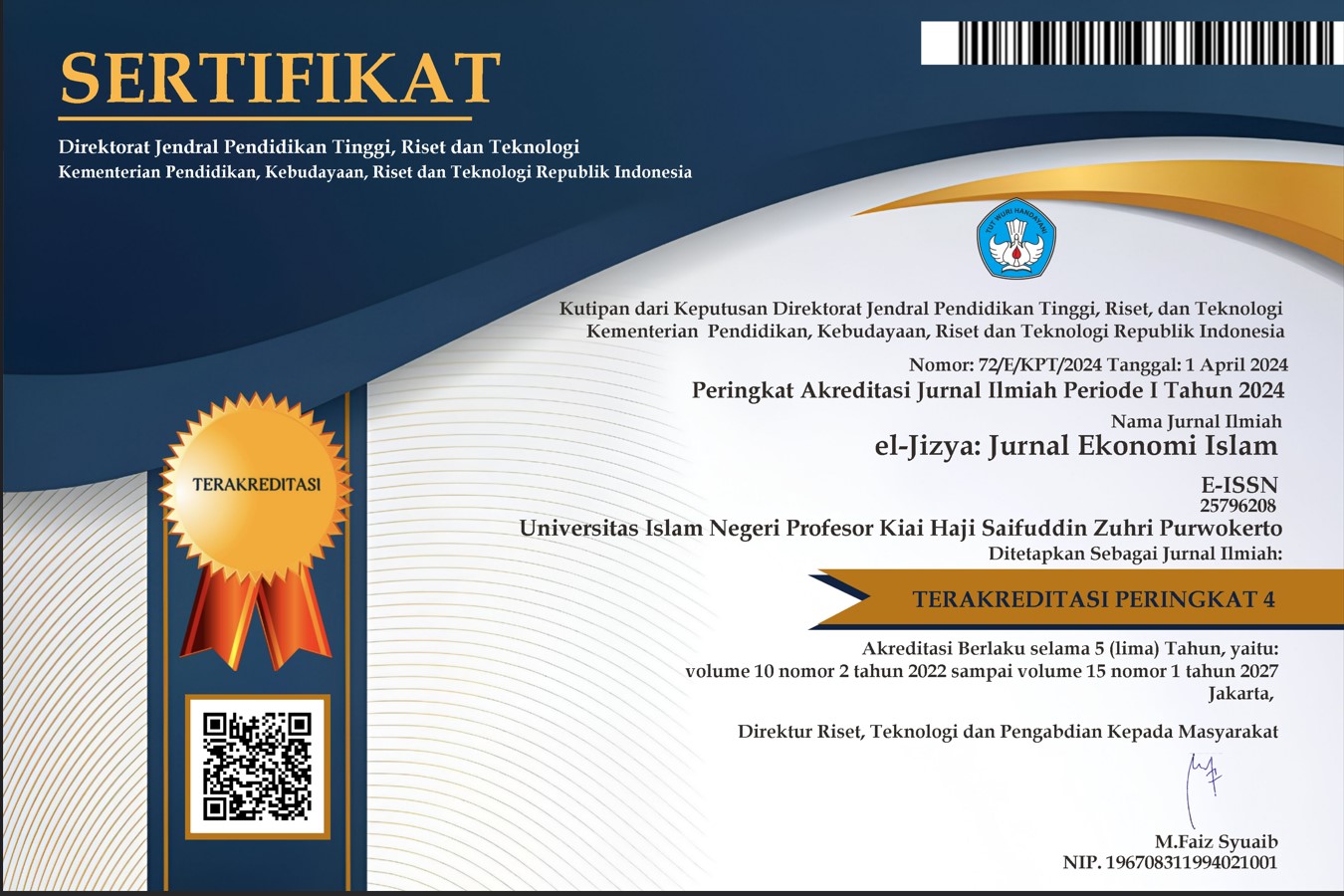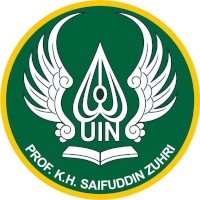Do Poverty and Human Development Index Influence Happiness? Evidence from Indonesia through Islamic Studies Approach
DOI:
https://doi.org/10.24090/ej.v10i1.6017Keywords:
Poverty, Human Development Index, Happiness, Islamic StudiesAbstract
This research aims to examine the relationship between poverty and human development index to happiness rate in Indonesia through Islamic studies approach. This is because poverty Indonesia till become a prominent economic issue but, it has a high rate of happiness compared to another developed country in ASIA at the same time. Besides, to reach such happiness, it also needs a great human development as an indicator to create welfare of such countries. This is a quantitative research with multiple regressions, using macro-economic data since 2014 & 2017 from 33 provinces of Indonesia as a sample. The result revealed that poverty and human development index have a positive significant effect on happiness. Then, this empirical finding is in line with the concept of maqāṣid al-syariah, specifically hifdz al- dīn and hifdz al-‘aql.References
A. Huq. (1996). Poverty, Inequality and role of some of the Islamic economic institutions. In M. A. Mannan & M. Ahmad, Eds. Economic development in an Islamic framework. International Institute of Islamic Economics, International Islamic University.
al-Qardhawi, Y. (2002). Zakah role in curing social and economic malaises. In M. Kahf Ed. Economics of zakah—A book of readings. In 2nd edn: Islamic Research and Training Institute. Islamic Development Bank.
Arif, M., Ismail, M., & Santoso, D. B. (2019). Does microfinance affect poverty reduction and inequality in indonesia? International Journal of Scientific and Technology Research.
Auda, J. (2019). Maqasid al-Shariah as Philosophy of Islamic Law A Systems Approach. In Maqasid Al-Shariah as Philosophy of Islamic Law. The International Institute of Islamic Thought.
Awaludin, A. (2019). Konsep Kebahagiaan dalam ISlam.
Badan Pusat Statistik indonesia, B. P. S. indonesia. (2021). Profil Kemiskinan Indonesia Juni 2021. https://www.bps.go.id/website/images/Kemiskinan-Maret-2021-ind.jpg
Caria, S. A., & Falco, P. (2018). Does the risk of poverty reduce happiness? Economic Development and Cultural Change. https://doi.org/10.1086/697556
Clark, A. E., Frijters, P., & Shields, M. A. (2008). Relative income, happiness, and utility: An explanation for the Easterlin paradox and other puzzles. Journal of Economic Literature. https://doi.org/10.1257/jel.46.1.95
Dalhat, D. Y. (2015). Introduction to Research Methodology in Islamic Studies. Journal of Islamic Studies and Culture. https://doi.org/10.15640/jisc.v3n2a15
Danil, M. (2020). Pentingnya Memahami Peran Metodologi Studi Islam Terhadap Generasi Milenial di Era Digitalisasi. Profetika: Jurnal Studi Islam.
Elvirawati, E., Harahap, E. F., & Tasri, E. S. (2020). Analisis Pengaruh Indeks Pembangunan Manusia (IPM) Terhadap Indeks Kebahagiaan di Indonesia. Universitas Bung Hatta.
Furwanti, R., Lestari, D. M., Muflikha, M., & Muhammad Ghafur Wibowo. (2021). Determinant of Macro-Economics: Does Income Inequality Influence Happiness? Evidence From Indonesia. Journal of Economics and Policy, 14(01).
Hall, J., & Helliwell, J. F. (2015). Happiness and Human Development (Ocassional Paper). http://hdr.undp.org/sites/default/files/happiness_and_hd.pdf
Hanson, S. (2018, November). The Happiness Equation: Does Poverty Affect Happiness? Sojourner’s Heart: A Magazine Devoted to Exploring the Inner-Outer Journey Parallels. Most Articles Are Written by Bethel University Students. https://medium.com/sojourners-heart/the-happiness-equation-does-poverty-effect-happiness-ecf12e9f83a
Hasan, M. . (2010). An Integrated Poverty Alleviation Model Combining Zakat, Awqaf and Microfinance. Paper Presented at Seventh International Conference – The Tawhidi Epistemology: Zakat and Waqf Economy.
Helliwell, J. F., Huang, H., Wang, S., & Norton, M. (2021). Statistical of World Happiness Report 2021.
Howell, R. T., & Howell, C. J. (2008). The Relation of Economic Status to Subjective Well-Being in Developing Countries: A Meta-Analysis. Psychological Bulletin. https://doi.org/10.1037/0033-2909.134.4.536
Idrus, S., & Rosida, L. (2020). Poverty In Indonesia: Critical Review. Archives of Business Research. https://doi.org/10.14738/abr.86.8326
Kahneman, D., Wakker, P. P., & Sarin, R. (1997). Back to Bentham? Explorations of experienced utility. Quarterly Journal of Economics. https://doi.org/10.1162/003355397555235
Wawancara Hubungan Kemiskinan dan Indeks Pembangunan Manusia Terhadap Kebahagiaan Dengan Bapak Kastolani, (2021).
M. Iqbal. (2002). Introduction, In M. Iqbal Ed. Islamic economic institutions and the elimination of poverty. Islamic Foundation.
Majumdar, C., & Gupta, G. (2015). Don’t worry, be happy : A survey of the economics of happiness. In Economic and Political Weekly.
Ngoo, Y. T., & Tey, N. P. (2019). Human development index as a predictor of life satisfaction. Journal of Population and Social Studies. https://doi.org/10.25133/JPSSV27N1.005
Nofal, A. . (1984). Al-Zakat, The poor due, Translated from Arabic by T. Tawfik. The Supreme Council for Islamic Affair.
Pugno, M. (2019). Happiness, human development, and economic (De)growth. Annals of the Fondazione Luigi Einaudi. https://doi.org/10.26331/1088
Schimmel, J. (2009). Development as Happiness: The Subjective Perception of Happiness and UNDP’s Analysis of Poverty, Wealth and Development. Journal Of Happiness Studies, 10(1), 93–111. https://doi.org/10.1007/s10902–007–9063–4
Shabbir, M. S., Kassim, N. M., Faisal, M., Abbas, M., & Sabti, Y. M. (2018). Poverty reduction through Islamic modes of finance; The way forward. Journal of Social Sciences Research. https://doi.org/10.32861/jssr.spi4.58.65
Suryahadi, A., Al Izzati, R., & Suryadarma, D. (2020). Estimating the Impact of Covid-19 on Poverty in Indonesia*. Bulletin of Indonesian Economic Studies. https://doi.org/10.1080/00074918.2020.1779390
United Nation. (2009). Multidimensional poverty measurement.
United Nations Development Program (UNDP). (1990). Human Development Report 1990: Concept and Measurement of Human Development. Oxford University Press.
World Bank. (2010). Poverty Reduction Support Credits - an Evaluation of World Bank Support.
al-Qardhawi, Y. (2002). Zakah role in curing social and economic malaises. In M. Kahf Ed. Economics of zakah—A book of readings. In 2nd edn: Islamic Research and Training Institute. Islamic Development Bank.
Arif, M., Ismail, M., & Santoso, D. B. (2019). Does microfinance affect poverty reduction and inequality in indonesia? International Journal of Scientific and Technology Research.
Auda, J. (2019). Maqasid al-Shariah as Philosophy of Islamic Law A Systems Approach. In Maqasid Al-Shariah as Philosophy of Islamic Law. The International Institute of Islamic Thought.
Awaludin, A. (2019). Konsep Kebahagiaan dalam ISlam.
Badan Pusat Statistik indonesia, B. P. S. indonesia. (2021). Profil Kemiskinan Indonesia Juni 2021. https://www.bps.go.id/website/images/Kemiskinan-Maret-2021-ind.jpg
Caria, S. A., & Falco, P. (2018). Does the risk of poverty reduce happiness? Economic Development and Cultural Change. https://doi.org/10.1086/697556
Clark, A. E., Frijters, P., & Shields, M. A. (2008). Relative income, happiness, and utility: An explanation for the Easterlin paradox and other puzzles. Journal of Economic Literature. https://doi.org/10.1257/jel.46.1.95
Dalhat, D. Y. (2015). Introduction to Research Methodology in Islamic Studies. Journal of Islamic Studies and Culture. https://doi.org/10.15640/jisc.v3n2a15
Danil, M. (2020). Pentingnya Memahami Peran Metodologi Studi Islam Terhadap Generasi Milenial di Era Digitalisasi. Profetika: Jurnal Studi Islam.
Elvirawati, E., Harahap, E. F., & Tasri, E. S. (2020). Analisis Pengaruh Indeks Pembangunan Manusia (IPM) Terhadap Indeks Kebahagiaan di Indonesia. Universitas Bung Hatta.
Furwanti, R., Lestari, D. M., Muflikha, M., & Muhammad Ghafur Wibowo. (2021). Determinant of Macro-Economics: Does Income Inequality Influence Happiness? Evidence From Indonesia. Journal of Economics and Policy, 14(01).
Hall, J., & Helliwell, J. F. (2015). Happiness and Human Development (Ocassional Paper). http://hdr.undp.org/sites/default/files/happiness_and_hd.pdf
Hanson, S. (2018, November). The Happiness Equation: Does Poverty Affect Happiness? Sojourner’s Heart: A Magazine Devoted to Exploring the Inner-Outer Journey Parallels. Most Articles Are Written by Bethel University Students. https://medium.com/sojourners-heart/the-happiness-equation-does-poverty-effect-happiness-ecf12e9f83a
Hasan, M. . (2010). An Integrated Poverty Alleviation Model Combining Zakat, Awqaf and Microfinance. Paper Presented at Seventh International Conference – The Tawhidi Epistemology: Zakat and Waqf Economy.
Helliwell, J. F., Huang, H., Wang, S., & Norton, M. (2021). Statistical of World Happiness Report 2021.
Howell, R. T., & Howell, C. J. (2008). The Relation of Economic Status to Subjective Well-Being in Developing Countries: A Meta-Analysis. Psychological Bulletin. https://doi.org/10.1037/0033-2909.134.4.536
Idrus, S., & Rosida, L. (2020). Poverty In Indonesia: Critical Review. Archives of Business Research. https://doi.org/10.14738/abr.86.8326
Kahneman, D., Wakker, P. P., & Sarin, R. (1997). Back to Bentham? Explorations of experienced utility. Quarterly Journal of Economics. https://doi.org/10.1162/003355397555235
Wawancara Hubungan Kemiskinan dan Indeks Pembangunan Manusia Terhadap Kebahagiaan Dengan Bapak Kastolani, (2021).
M. Iqbal. (2002). Introduction, In M. Iqbal Ed. Islamic economic institutions and the elimination of poverty. Islamic Foundation.
Majumdar, C., & Gupta, G. (2015). Don’t worry, be happy : A survey of the economics of happiness. In Economic and Political Weekly.
Ngoo, Y. T., & Tey, N. P. (2019). Human development index as a predictor of life satisfaction. Journal of Population and Social Studies. https://doi.org/10.25133/JPSSV27N1.005
Nofal, A. . (1984). Al-Zakat, The poor due, Translated from Arabic by T. Tawfik. The Supreme Council for Islamic Affair.
Pugno, M. (2019). Happiness, human development, and economic (De)growth. Annals of the Fondazione Luigi Einaudi. https://doi.org/10.26331/1088
Schimmel, J. (2009). Development as Happiness: The Subjective Perception of Happiness and UNDP’s Analysis of Poverty, Wealth and Development. Journal Of Happiness Studies, 10(1), 93–111. https://doi.org/10.1007/s10902–007–9063–4
Shabbir, M. S., Kassim, N. M., Faisal, M., Abbas, M., & Sabti, Y. M. (2018). Poverty reduction through Islamic modes of finance; The way forward. Journal of Social Sciences Research. https://doi.org/10.32861/jssr.spi4.58.65
Suryahadi, A., Al Izzati, R., & Suryadarma, D. (2020). Estimating the Impact of Covid-19 on Poverty in Indonesia*. Bulletin of Indonesian Economic Studies. https://doi.org/10.1080/00074918.2020.1779390
United Nation. (2009). Multidimensional poverty measurement.
United Nations Development Program (UNDP). (1990). Human Development Report 1990: Concept and Measurement of Human Development. Oxford University Press.
World Bank. (2010). Poverty Reduction Support Credits - an Evaluation of World Bank Support.
Downloads
Published
29-07-2022
How to Cite
Lestari, D. M., Muslim, A., Furwanti, R., & Solikhin, I. (2022). Do Poverty and Human Development Index Influence Happiness? Evidence from Indonesia through Islamic Studies Approach. El-Jizya : Jurnal Ekonomi Islam, 10(1), 21–32. https://doi.org/10.24090/ej.v10i1.6017
Issue
Section
Articles
License
Authors who publish with this journal agree to the following terms:
- Authors retain copyright and grant the journal right of first publication with the work simultaneously licensed under a Creative Commons Attribution-ShareAlike License that allows others to share the work with an acknowledgement of the work's authorship and initial publication in this journal.
- Authors are able to enter into separate, additional contractual arrangements for the non-exclusive distribution of the journal's published version of the work (e.g., post it to an institutional repository or publish it in a book), with an acknowledgement of its initial publication in this journal.
- Authors are permitted and encouraged to post their work online (e.g., in institutional repositories or on their website) prior to and during the submission process, as it can lead to productive exchanges, as well as earlier and greater citation of published work (See The Effect of Open Access).















